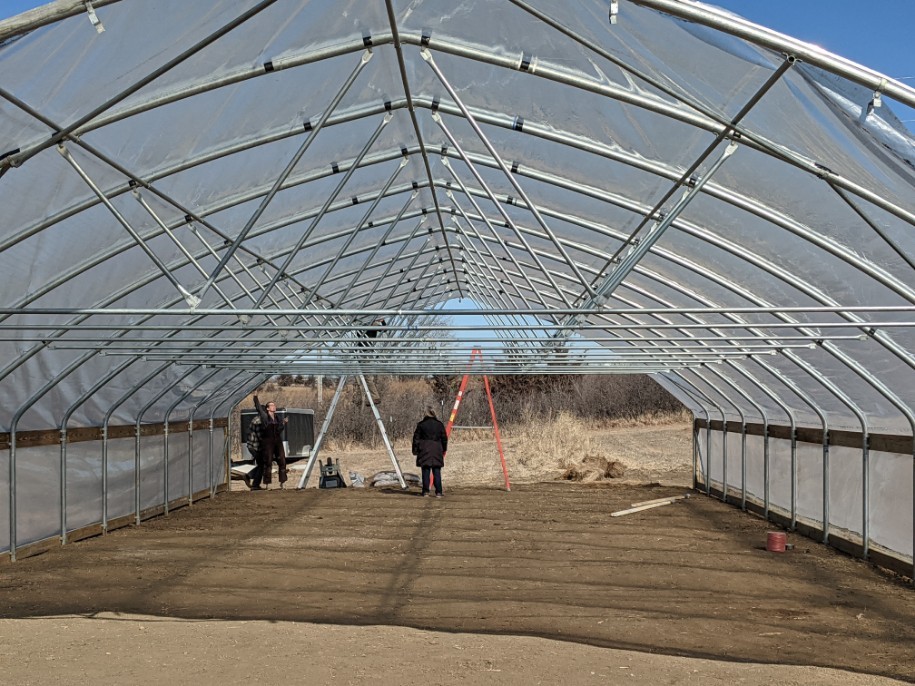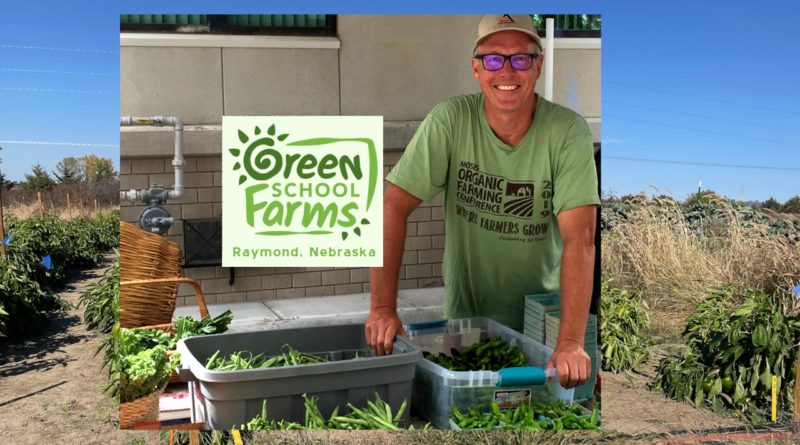Green School Farms on the Front Line of Sustainability
Podcast: Play in new window | Download (Duration: 1:58:00 — 56.7MB)
Subscribe: Apple Podcasts | Spotify | Android | iHeartRadio | Podchaser | Email | TuneIn | RSS | More
(March 20, 2022) So you want to be a farmer. Are you sure? First you might want to talk to Gary Fehr. He runs Green School Farms, just outside of Lincoln, Nebraska. It’s a small operation, about 20 acres. He grows vegetables on one acre. 12 acres produce alfalfa for hay. He just restored 5 acres as prairie. There are a few trees. There isn’t even a house. Not yet. As you can tell, it’s pretty modest. That doesn’t stop Fehr from being on the front lines of some pretty important issues.

Green School Farms “was founded with a vision to help Nebraska schools offer locally and sustainably produced food in their food service programs. We offer technical assistance to schools to help them source and promote healthy food to their students.” To that end, Fehr is working with Partnership for a Healthy Lincoln. He has gathered together local farmers to supply fresh produce for kids to try, “many for the first time.” I guess that’s why we need
National Nutrition Month. By the way, he also donates food to We Can Do This. We Feed The Kids At F Street Community Center Every Weekend.
But it ain’t easy. Fehr commutes 30 miles to work. As I mentioned, there is no farm house. Just a shipping container that serves as a shed. And his greenhouse is almost finished, though not in time to grow seedlings this year. He grows 30 varieties of vegetables, with minimal machinery. Fehr tells us he is also fighting drought. That’s not surprising, given that NOAA’s Climate.gov is predicting drought conditions to expand in 2022.
Software to sustainability
Gary Fehr can’t even claim that farming has always been in his blood. Until the early 2000’s, he was a software engineer. But he gradually became curious about food and how it is produced. Green School Farms started production in 2015. Now he confronts the challenges of sustainable, regenerative, and organic systems. He writes,
It humbles me now to know how much one needs to know to produce healthy food – dealing with weeds, pests and fertility in a wonderfully complex ecology of a sustainable farm. A farm where the automatic response is not to simply dump another chemical at the problem and trust that the corporate “experts” have proven its long-term safety to our world, our environment, or our own bodies. A farm where the philosophy is to work with Mother Earth rather than dominate and control her.
So, today, we’re going on a tour of Green School Farms. We hope the weather and the tech cooperate. It should be fun, because Fehr took us on a tour of the Sunday Farmers’ Market at College View on our show in 2020. It was a lot of fun and we expect this morning’s tour to be just as good. He’s the kind of guy you want to know.
The Green Pages
Since our loyal viewers didn’t come up with a title for this section, I had to do it myself. I really wanted to give away valuable Wally prizes. Oh, well. For now, we’re calling it The Green Pages. You know, like The Yellow Pages, only green. We’ll see if the title sticks. Anyway, these are some green stories of note during the week. There will be a quiz, so ready them all the way through.
We start with some weather and climate news.
U.S. Spring Outlook 2022: Drought to expand amid warmer conditions – Climate.gov
Antarctica has experienced unfathomable temperatures in recent days – U.S. Storm Watch
New Omicron Wave Threatens These U.S. Cities as Officials Relax COVID Rules – Newsweek
Today, March 20 is Plant a Seed Day – PlantaSeedDay.org
Tuesday, March 22 is World Water Day – WorldWaterDay.org
Friends of the Parks puts chips on the table in Chicago casino sweepstakes – Chicago Sun-Times
That story seems at odds with this op-ed:
Gerald Adelmann, et al.: A casino on Chicago’s lakefront? That’s a deadly gamble for migratory birds. – Chicago Tribune
A not so appetizing report on weed killer in our food – UnSpun
Sleep experts say Senate has it wrong: Standard time, not daylight saving, should be permanent – Washington Post


